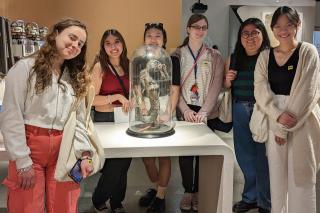Simmons University is officially partnered with Washington University in St. Louis in the Engineering 3+2 program, in addition to Columbia University. As part of this program, students complete three years of course work at Simmons, followed by two additional years at a partner institution, earning both a Bachelor of Science in Engineering and a Bachelor of Science from Simmons. We spoke to former Co-Director of the Program, Professor Nanette Veilleux and Professor and Director Jason White about what this new partnership and what the program means for Simmons students.
"I've taught [at Simmons] for several years now, and I appreciate the small liberal arts approach to education," says Professor Jason White, who took over the Directorship of the 3+2 Engineering Program in Spring 2023. "I see how our students benefit from the faculty to student ratio, which allows them to have a very different experience than students at a big research university."
These student-faculty relationships are seen as a core Simmons strength, and are of particular value to BIPOC and first-generation students in need of vital support. Reflecting on his own undergraduate experience at a large institution, White says that he learned more from graduate students and peers than from his professors. The small size of the institution, however, does create barriers for studying Engineering. "We don't have the resources to train engineering students. Big universities have these programs because they have the resources not only for faculty, but for the equipment necessary for training."
This highlights both the necessity and benefits of the 3+2 program. "You can get a liberal arts education at a small institution, including access to professors who are experts in engineering and other STEM fields," says White. "That closeness with faculty is something that large universities can't provide. This way, students get the best of both worlds." After three years of fundamental training in math and science at Simmons, students go to Columbia or Washington University [in St. Louis] for two years, to complete their engineering training.
Our new partner, Washington University in St. Louis, has a lot to offer Simmons students. Having partnered with other universities, they have an infrastructure in place for bringing students on campus for two years for a degree in engineering. "It's been an active collaboration," notes Professor Veilleux. "Both programs offer equivalent Engineering degree options with some signature strengths."
Veilleux and White are confident that Simmons students will be uniquely prepared to matriculate into these larger universities. "We're a women-centered college," notes Veilleux, who has been at Simmons for 24 years. "Women are going to get more scrutiny [in the Engineering field] and be judged more harshly. We give them three years to prepare, offering networking experience, panels with professionals, and close relationships with faculty. We allow them to find their voice and become confident in who they are, while holding them to a strict GPA. By the time they leave Simmons, they know themselves enough to be confident when entering these new environments."
Students are also expected to do independent research while at Simmons, and to present their work on campus and externally. Third year students in Physics, Chemistry or Biochemistry undertake a senior thesis, and there are also research opportunities outside of the institution. "When they leave, they already have hands-on experience and are comfortable with a lab environment and a machine shop," Veilleux notes, "we can give our students these opportunities because of the student/faculty ratio."
To that point, White describes Simmons as "small, but not isolated. We're located in a hub of engineering, especially Biotech." White's work with the Biomedical Ultrasound Lab includes a strong collaboration with Brigham and Women's Hospital, where students can see how their work is translated into a clinical environment. "We aren't just isolated academics," says White, "we actually make things that apply to the social good. We invite students to the hospital to see people treated for motion disorders [with techniques learned in Ultrasound Lab] and the effects are immediate — the patient's tremors are gone. It changes the way they see science and engineering."
Prospective students interested in the 3+2 program will have an opportunity to meet with the Program Director from Washington University at Simmons this fall. "Living and studying in New York is different from living in St. Louis," White notes, "the location is something to consider." For current students, acceleration is not guaranteed, and depends on where the student is in their course of study.
As with all STEM fields, Engineering has a lot to offer. How do students figure out if this field is right for them?
"Engineering has many subspecialities: biomedical, mechanical, environmental," says White. "A lot of them go out into the industry to develop products and methods that change the way that humans live. All of the technical devices and chemicals that we work with were created by engineers who thought, how are we going to build and manufacture this effectively, efficiently and responsibly?"

